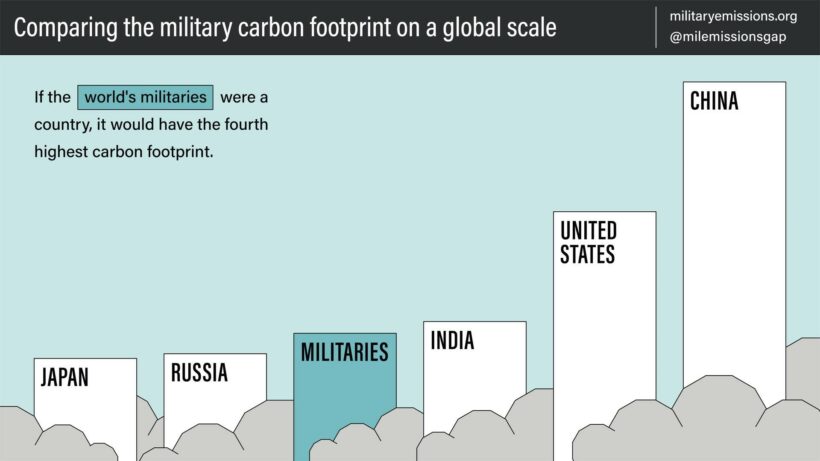A new report issued today by the Conflict and Environment Observatory (CEOBS) and Scientists for Global Responsibility reveals that militaries are responsible for at least 5.5% of greenhouse gas emissions worldwide. The authors calculate that if the world’s militaries combined were a country, it would be the fourth-highest emitting country in the world, ahead of Russia.
Information about emissions related to military activities is often opaque and difficult to access. The authors drew upon the limited data available around military bases, vehicles, bases, and industrial supply chains.
Numerous additional factors were not possible to include, such as impacts of warfighting (fires, etc.), damage to infrastructure and ecosystems, post-conflict reconstruction, and healthcare for survivors of military conflict. This means that the true scale of the “global military bootprint” is likely even larger.
There is no consistent requirement for countries to report their military emissions to the United Nations Framework Convention on Climate Change (UNFCCC). Many countries with large militaries — including India, Saudi Arabia and South Korea — do not provide any information at all to the UNFCCC. Other countries that do provide information to the UNFCCC have actually reported an increase in emissions in the past year. These countries include Australia, Cyprus, Czechia, Denmark, Greece, Hungary, Italy, Netherlands, Switzerland and Ukraine.
Linsey Cottrell, Environmental Policy Officer at CEOBS said, “The bar is pretty low for current reporting requirements to the UNFCCC for military fuel use, but most of the top military spending countries are failing to even meet this low standard. As a first step, we need the UNFCCC to strengthen its reporting protocols for governments’ militaries.”
Without accurate information, it will be extremely difficult for countries to set targets to achieve net zero emissions, much less actually achieve those targets. As the planet continues to warm due to the billions of tons of greenhouse gasses humans have already released into the atmosphere, it will require concerted action by all sectors — including militaries — to change our course.
For many people around the world, the war in Ukraine is the military conflict that they are most aware of. According to a recent op-ed in Nature, “The Ukrainian government is calculating the financial and environmental costs of the impact of the conflict on the climate — the first time that any conflict-affected state has done so — which will be raised at COP27.”
The costs of war are most often measured in terms of human casualties, infrastructure destroyed, refugees, and money spent. Adding a climate dimension to the costs of war will make it even clearer that the world must urgently find ways to make peace for the sake of current and future generations.






